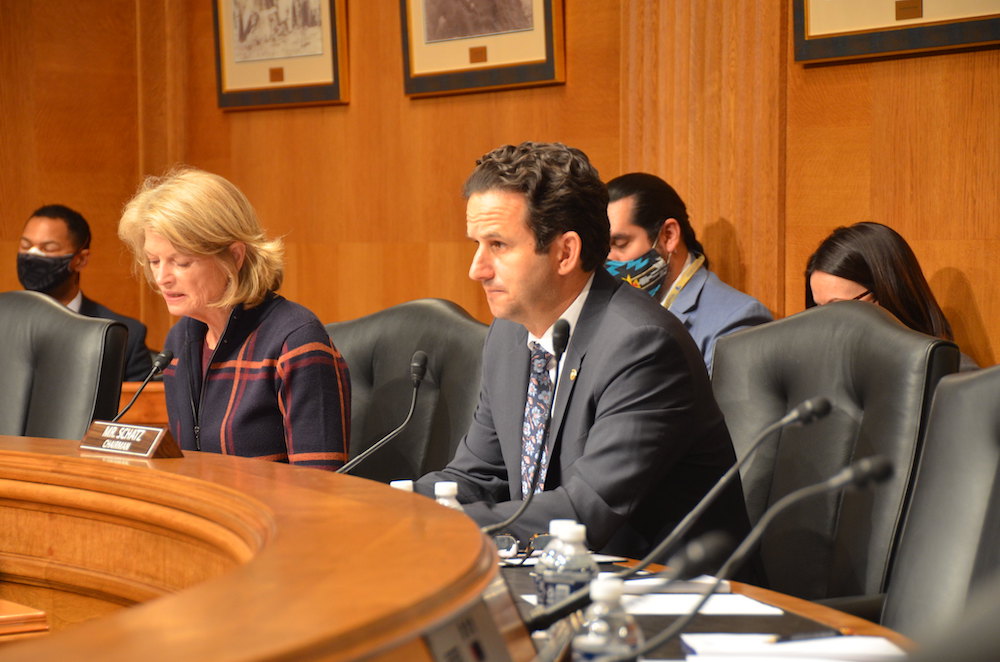
- Details
- By Brian Edwards
WASHINGTON – A bipartisan group of 13 U.S. Senators is asking universities and museums with large collections of Native American human remains why they’ve failed to repatriate them to tribes—more than 30 years after a federal law was passed that compelled them to do so.
In letters sent to the University of California-Berkeley, Harvard University, Illinois State Museum, Indiana University, and the Ohio History Connection, the senate group—led by Sens. Brian Schatz (D-HI) and Lisa Murkwoski (R-AK) of the Senate Committee on Indian Affairs—urged the institutions to comply with the federal Native American Graves Protection and Repatriation Act (NAGPRA) and “expeditiously return” cultural items and ancestral remains.
Signed into law in 1990, NAGPRA directs federal agencies and museums with possession or control over holdings or collections of Native American human remains and funerary objects to inventory them, identify their geographic and cultural affiliation, and notify the affected Indian tribes or Native Hawaiian organization.
The five institutions that received the letters possess some of the largest collections of Native American human remains, according to federal records. Many were identified in recent media reports, including Native News Online reporting and a ProPublica and NBC News investigation that highlights how prestigious universities and museums have delayed repatriation requests and failed the mandate set by NAGPRA.
“Delayed repatriation is delayed justice for Native peoples,” the senators said in letters to the five institutions. “For too long, Native ancestral remains and cultural items have been unconscionably denied their journey home by institutions, desecrated by scientific study, publicly displayed as specimens, left to collect dust on a shelf, or simply thrown in a box and forgotten in a museum storeroom.”
In the letters, the senators requested that the universities and museums provide an update over the next 60 days on their current process and pace of repatriation, as well as information about their policies and practices pursuant to NAGPRA.
The letters were also signed by Senators Catherine Cortez Masto (D-NV), Martin Heinrich (D-NM), Mazie Hirono (D-HI), Ben Ray Luján (D-NM), Patty Murray (D-WA), Alex Padilla (D-CA), Kyrsten Sinema (I-AZ), Tina Smith (D-MN), Dan Sullivan (R-AK), Jon Tester (D-MT), and Elizabeth Warren (D-MA).
The letters note positive impacts that NAGPRA has created, but also mentions “troubling testimony” about the failure of institutions to complete repatrations in a timely manner.
“While NAGPRA has had positive and far-reaching impacts, such as improved relationships between museums, institutions, federal agencies, and Native peoples, and significant, successful repatriation of many cultural items and ancestral remains, Congress continues to receive troubling testimony detailing ongoing issues related to the timely completion of NAGPRA repatriations,” the senators write.
National Congress of American Indians President Fawn Sharp issued a statement commending the Senators' bipartisan efforts. "For centuries, our cultural items, our sacred items, and our ancestors have been taken from us and kept from us, but today's efforts acknowledge what we have long said: there is no acceptable reason to continue this practice and no acceptable reason for delays—now is the time to right this historic and ongoing wrong," Sharp said.
More Stories Like This
NCAI Passes Two Emergency Resolutions on Immigration Enforcement ActivitiesChickasaw Lighthorse Police Officer named Indian Country Law Enforcement Officer of the Year
Indian Gaming Association Rallies Broad Coalition Against Sports Event Contracts It Calls Illegal Threat to Tribal Sovereignty
Navajo Resources and Development Committee Issues Notice on Livestock Inspection Requirements
American Prairie, Tribal Coalition Files Protest Over Rescinded Grazing Rights
Help us defend tribal sovereignty.
At Native News Online, our mission is rooted in telling the stories that strengthen sovereignty and uplift Indigenous voices — not just at year’s end, but every single day.
Because of your generosity last year, we were able to keep our reporters on the ground in tribal communities, at national gatherings and in the halls of Congress — covering the issues that matter most to Indian Country: sovereignty, culture, education, health and economic opportunity.
That support sustained us through a tough year in 2025. Now, as we look to the year ahead, we need your help right now to ensure warrior journalism remains strong — reporting that defends tribal sovereignty, amplifies Native truth, and holds power accountable.
 The stakes couldn't be higher. Your support keeps Native voices heard, Native stories told and Native sovereignty defended.
The stakes couldn't be higher. Your support keeps Native voices heard, Native stories told and Native sovereignty defended.
Stand with Warrior Journalism today.
Levi Rickert (Potawatomi), Editor & Publisher


